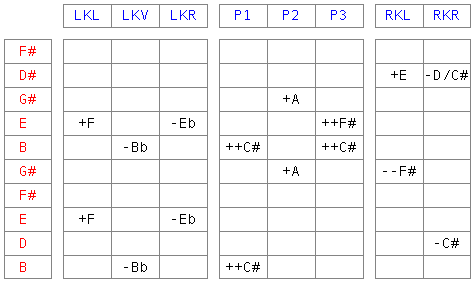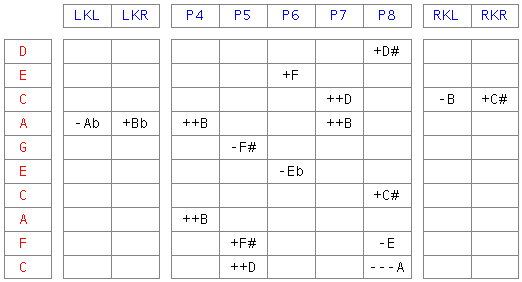6th and 7th levers
Moderator: Shoshanah Marohn
- Darryl Hattenhauer
- Posts: 1725
- Joined: 16 Nov 2005 1:01 am
- Location: Phoenix, Arizona, USA
- Contact:
6th and 7th levers
Please pardon my ignorance, but what do knee levers beyond the fifth do, and where are they located?
Steel crazy after all these years.
$100 reward for info leading to the purchase of a fender D8 white, yellow, or butterscotch.
$100 reward for info leading to the purchase of a fender D8 white, yellow, or butterscotch.
- Richard Sinkler
- Posts: 17067
- Joined: 15 Aug 1998 12:01 am
- Location: aka: Rusty Strings -- Missoula, Montana
They can do whatever you want them too. Normally, they are mounted on the left knee. You would have 2 left knee left and 2 left knee right levers (assuming 7 levers on the E9neck - if adding to the C6th, they would be mounted between the right levers and the left E9 levers so you could have your knee between them when your foot is over the C6th pedals). You will hear them referred to as "staggered", as usually, they have one that is slightly to the right or left of the main levers on the knee.
Most common knee lever changes, and this is not meant to be the only changes are:
E to Eb; E to F, F# to G (1 & 7), 2nd string D# to D and/or C#, and many also lower 9 to C#; string 1 to F# to G# and possibly string 2 D# to E on the same lever; 6th string G# to F#, sometimes on a lever by itself (like mine) or on another lever such as the one lowering string 2, the one raising the first string (G or G#) and possibly others, B's to Bb is a common lever; raising string 7 from F# to G# is becoming more and more popular; raising string 4 to F# (and possibly string 8 too) is a change that some have; lower the G#'s to G is somewhat popular;
Many more will probably be mentioned, but those are the one's I can think of off the top of my head right now.
Of course I have included in that list, changes that are already on your guitar.
Here is a picture of my LKL staggered levers. They are the 2 that are fully erect. The main one (my E to D# lever) is the one toward the middle of the guitar and makes contact with my knee in my normal sitting position, and the other that is slightly to the right is my other LKL. To activate it, I just have to move my knee back maybe and inch or and inch and a half to activate it.

Most common knee lever changes, and this is not meant to be the only changes are:
E to Eb; E to F, F# to G (1 & 7), 2nd string D# to D and/or C#, and many also lower 9 to C#; string 1 to F# to G# and possibly string 2 D# to E on the same lever; 6th string G# to F#, sometimes on a lever by itself (like mine) or on another lever such as the one lowering string 2, the one raising the first string (G or G#) and possibly others, B's to Bb is a common lever; raising string 7 from F# to G# is becoming more and more popular; raising string 4 to F# (and possibly string 8 too) is a change that some have; lower the G#'s to G is somewhat popular;
Many more will probably be mentioned, but those are the one's I can think of off the top of my head right now.
Of course I have included in that list, changes that are already on your guitar.
Here is a picture of my LKL staggered levers. They are the 2 that are fully erect. The main one (my E to D# lever) is the one toward the middle of the guitar and makes contact with my knee in my normal sitting position, and the other that is slightly to the right is my other LKL. To activate it, I just have to move my knee back maybe and inch or and inch and a half to activate it.

Carter D10 8p/8k, Dekley S10 3p/4k C6 setup,Regal RD40 Dobro, NV400, NV112 . Playing for 53 years and still counting.
Buddy Emmons D-10 copedent is as close to a standard as you can get. The 6th and 7th knee levers LKL and LKR work the C6th neck. The right knee levers work both necks.
E9th:

C6th:

Adding two more levers to E9th, as Richard has done, makes a "Crawford Cluster". It's not a standard configuration, but it gives you a lot of options.
E9th:

C6th:

Adding two more levers to E9th, as Richard has done, makes a "Crawford Cluster". It's not a standard configuration, but it gives you a lot of options.
-𝕓𝕆𝕓- (admin) - Robert P. Lee - Recordings - Breathe - D6th - Video
- Steve Lipsey
- Posts: 1900
- Joined: 9 May 2011 8:51 pm
- Location: Portland, Oregon, USA
- Contact:
E-F# is a good one for LKL2 (if LKL is E-F) because it doesn't matter if you hit the LKL a bit while reaching for the LKL2, which is just going to move the pitch further anyway...
I use mine for fun....I now have LKL2 doing D-E (string 9) and F#-G# (string 7) for a full open major scale with some repeats, for doing open string sacred steel "framming" strums across strings 10 through 3 (or 2, with RKR doing D#-C#), with a 9th chord across all 10 strings - those big chords do have a "cathedral" sound to them...
I use mine for fun....I now have LKL2 doing D-E (string 9) and F#-G# (string 7) for a full open major scale with some repeats, for doing open string sacred steel "framming" strums across strings 10 through 3 (or 2, with RKR doing D#-C#), with a 9th chord across all 10 strings - those big chords do have a "cathedral" sound to them...
www.facebook.com/swingaliband & a few more....
Williams S10s, Milkman Pedal Steel Mini & "The Amp"
Ben Bonham "CooderNator" archtop parlor electric reso w/Fishman & Lollar string-through
Ben Bonham "ResoBorn" deep parlor acoustic reso with Weissenborn neck and Fishman
Ben Bonham Style 3 Tricone., 1954 Oahu Diana, 1936 Oahu Parlor Squareneck
Williams S10s, Milkman Pedal Steel Mini & "The Amp"
Ben Bonham "CooderNator" archtop parlor electric reso w/Fishman & Lollar string-through
Ben Bonham "ResoBorn" deep parlor acoustic reso with Weissenborn neck and Fishman
Ben Bonham Style 3 Tricone., 1954 Oahu Diana, 1936 Oahu Parlor Squareneck
- Bobby Snell
- Posts: 517
- Joined: 28 Jan 1999 1:01 am
- Location: Austin, Texas
- Trevor Carey-Smith
- Posts: 16
- Joined: 31 Oct 2007 5:56 pm
- Location: Wellington, New Zealand
- Contact:
Another question, partly just a curious one from an 8+4 player and partly to check I've got the logic behind my chord finder page correct, but I was wondering if you are able to activate more than one knee lever per knee. For example would you ever engage a left (or right) and vertical lever at once, or LKL and LKL2 together?
- Clete Ritta
- Posts: 2005
- Joined: 5 Jun 2009 6:58 pm
- Location: San Antonio, Texas
My D10 has 6 and 7 located to the right of the LKR. These are commonly referred to as "center" levers or CKL and CKR. They work on the C6 neck. I have 8 pedals, but they are split 4 for E9 and 4 for C6. CKL is the typical P4 on C6 which raises A's on 8 and 4 to B. CKR raises 10 a whole step and lowers 5 a whole step.
The LKV (vertical lowering B to Bb) used with LKR (lowering E's) and pedal A and B for a diminished chord is one example.Trevor Carey-Smith wrote:...would you ever engage a left (or right) and vertical lever at once...?